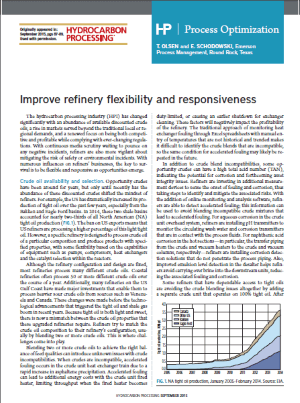The complexity in crude oil refining has grown due to many factors including mix of crude oil feedstocks, government regulations, and increasingly global customer base for refined product.
In a Hydrocarbon Processing article, Improve refinery flexibility and responsiveness, Emerson’s Tim Olsen and Ed Schodowski look at these challenges and how refiners and addressing them.
 They open highlighting the increasing abundance of opportunity crudes—discounted crude oil from tight oil, also known as shale oil formations. In 2014 two-thirds of the shale oil came from two basins—Eagle Ford in Texas and the Bakken in North Dakota.
They open highlighting the increasing abundance of opportunity crudes—discounted crude oil from tight oil, also known as shale oil formations. In 2014 two-thirds of the shale oil came from two basins—Eagle Ford in Texas and the Bakken in North Dakota.
Current U.S. law bans the export of crude oil but not refined products such as gasoline and diesel fuel, so this means:
…US refiners are processing a higher percentage of this light tight oil.
While refineries have some flexibility based on equipment such as pumps, compressors, catalysts, etc., they are designed to process a specific range of crude oil compositions. Many refineries along the US Gulf coast are configured to process heavier sour crudes from Venezuela and Canada and not the light and sweet tight oil.
To address this mismatch:
Refiners try to match the crude oil composition to their refinery’s configuration, usually by blending two or more crude oils. This is where challenges come into play.
These challenges include incompatibilities, which can cause:
…accelerated fouling…in the crude unit heat exchanger train due to a rapid increase in asphaltene precipitation. Accelerated fouling can lead to additional energy costs with the crude unit fired heater, limiting throughput when the fired heater becomes duty-limited, or causing an earlier shutdown for exchanger cleaning.
High total acid number (TAN) is another issue:
…indicating the potential for corrosion and forthcoming asset integrity issues.
Wireless monitoring technologies are available to address heat exchange fouling and corrosion detection that does not penetrate process piping.
For the first time since 1949, more refined products are exported than imported into the U.S. Refiners have to meet a much wider range of specification for export to a wider range of countries. To meet these challenges inline blending and just-in-time delivery solutions are being added, along with intermediate storage to overcome unplanned downtime of processing units for components:
…required to meet both quality specifications and required regulations.
To meet the flexibility requirements analyzer-driven blending enables:
…blending adjustments on the front end that impact desired product qualities and quantities on the back end. Using such a blending scheme, scheduling is improved by having visibility into incoming crude characteristics before purchase, as well as additional onsite analysis before being charged to the crude unit.
Tim and Ed note the advancements in automation technology that help address these challenges including:
…embedded advanced process control algorithms, statistical monitoring, smart device monitoring, asset health monitoring, the implementation of wireless sensing, and more.
These added eyes, ears and brains assist in improving overall safety, reliability and efficiency.
They close the article:
Opportunity crudes can be discounted and too tempting not to buy. Because properties can vary, a traditional crude assay does not completely represent the crude oil delivered to the refinery. Hence, the need is for real-time analysis to provide the data for crude blending. This also contributes to the component qualities and quantities needed for product blending; new served markets, with different quality specifications and regulations, increase the complexity. A refiner needs to be flexible and responsive to stay competitive and profitable moving forward.
You can connect and interact with other refining experts in the Refining group in the Emerson Exchange 365 community.






